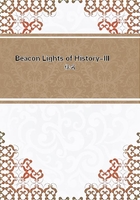
第63章
But Henry was weary with the struggle, and Becket was tired of exile,--never pleasant, even if voluntary. Moreover, the Prelate had gained the moral victory, even as Hildebrand did when the Emperor of Germany stooped as a suppliant in the fortress of Canossa. The King of England had virtually yielded to the Archbishop of Canterbury. Perhaps Becket felt that his mission was accomplished; that he had done the work for which he was raised up.
Wearied, sickened with the world, disgusted with the Pope, despising his bishops, perhaps he was willing to die. He had a presentiment that he should die as a martyr. So had the French king and his prelates. But Becket longed to return to his church and celebrate the festivities of Christmas. So he made up his mind to return to England, "although I know, of a truth," he said, "Ishall meet my passion there." Before embarking he made a friendly and parting visit to the King of France, and then rode to the coast with an escort of one hundred horsemen. As Dover was guarded by the King's retainers, who might harm him, he landed at Sandwich, his own town. The next day he set out for Canterbury, after an absence of seven years. The whole population lined the road, strewed it with flowers, and rent the air with songs. Their beloved Archbishop had returned. On reaching Canterbury he went directly to his cathedral and seated himself on his throne, and the monks came and kissed him, with tears in their eyes. One Herbert said, "Christ has conquered; Christ is now King!"From Canterbury Becket made a sort of triumphal progress through the kingdom, with the pretence of paying a visit to the young king at Woodstock,--exciting rather than allaying the causes of discord, scattering his excommunications, still haughty, restless, implacable; so that the Court became alarmed, and ordered him to return to his diocese. He obeyed, as he wished to celebrate Christmas at home; and ascending his long-neglected pulpit preached, according to Michelet, from this singular text: "I am come to die in the midst of you."Henry at this time was on the Continent, and was greatly annoyed at the reports of Becket's conduct which reached him. Then there arrived three bishops whom the Primate had excommunicated, with renewed complaints and grievances, assuring him there would be no peace so long as Becket lived. Henry was almost wild with rage and perplexity. What could he do? He dared not execute the Archbishop, as Henry VIII. would have done. In his age the Prelate was almost as powerful as the King. Violence to his person was the last thing to do, for this would have involved the King in war with the adherents of the Pope, and would have entailed an excommunication. Still, the supremest desire of Henry's soul was to get Becket out of the way. So, yielding to an impulse of passion, he said to his attendants, "Is there no one to relieve me from the insults of this low-born and turbulent priest?"Among these attendants were four courtiers or knights, of high birth and large estates, who, hearing these reproachful words, left the court at once, crossed the channel, and repaired to the castle of Sir Ranulf de Broc, the great enemy of Becket, who had molested him in innumerable ways. Some friendly person contrived to acquaint Becket with his danger, to whom he paid no heed, knowing it very well himself. He knew he was to die; and resolved to die bravely.
The four armed knights, meanwhile, on the 29th of December, rode with an escort to Canterbury, dined at the Augustinian abbey, and entered the court-yard of the Archbishop's palace as Becket had finished his mid-day meal and had retired to an inner room with his chaplain and a few intimate friends. They then entered the hall and sought the Archbishop, who received them in silence. Sir Reginald Fitzurst then broke the silence with these words: "We bring you the commands of the King beyond the sea, that you repair without delay to the young King's presence and swear allegiance.
And further, he commands you to absolve the bishops you have excommunicated." On Becket's refusal, the knight continued: "Since you will not obey, the royal command is that you and your clergy forthwith depart from the realm, never more to return." Becket angrily declared he would never again leave England. The knights then sprang to their feet and departed, enjoining the attendants to prevent the escape of Becket, who exclaimed: "Do you think I shall fly, then? Neither for the King nor any living man will I fly.
You cannot be more ready to kill me than I am to die."He sought, however, the shelter of his cathedral, as the vesper bell summoned him to prayers,--followed by the armed knights, with a company of men-at-arms, driving before them a crowd of monks.
The Archbishop was standing on the steps of the choir, beyond the central pillar, which reached to the roof of the cathedral, in the dim light shed by the candles of the altars, so that only the outline of his noble figure could be seen, when the knights closed around him, and Fitzurst seized him,--perhaps meaning to drag him away as a prisoner to the King, or outside the church before despatching him. Becket cried, "Touch me not, thou abominable wretch!" at the same time hurling Tracy, another of the knights, to the ground, who, rising, wounded him in the head with his sword.
The Archbishop then bent his neck to the assassins, exclaiming, "Iam prepared to die for Christ and His Church."Such was the murder of Becket,--a martyr, as he has been generally regarded, for the liberties of the Church; but, according to some, justly punished for presumptuous opposition to his sovereign.